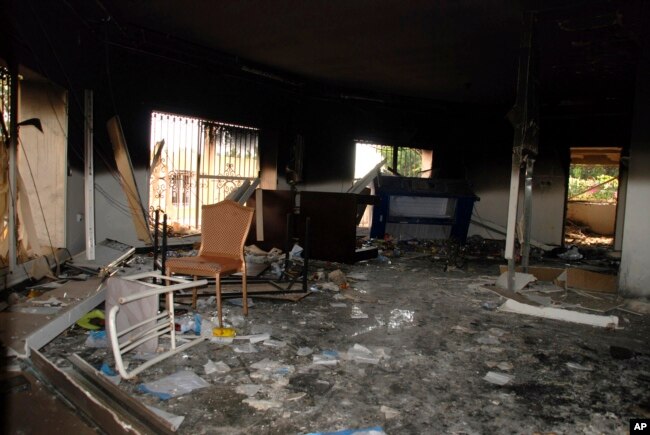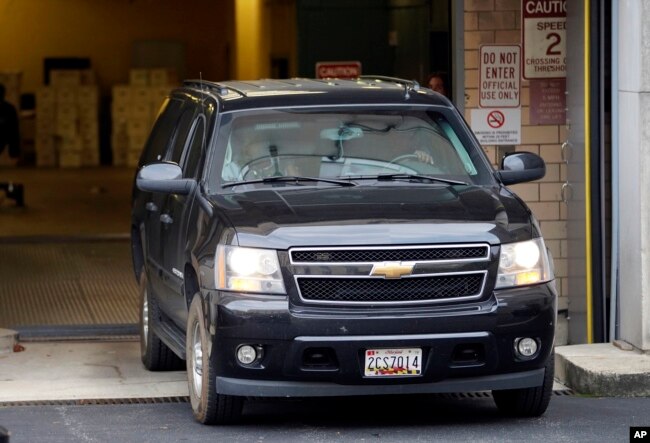The interrogation of a Libyan militant accused of playing an instrumental role in the 2012 Benghazi attacks was conducted lawfully and may be admitted at his trial next month, a federal judge has ruled, VOA news reports.
U.S. District Judge Christopher Cooper on Monday rejected defense attorneys’ claims that the militant, Mustafa al-Imam, had been suffering from mental trauma and seasickness when he agreed to speak with American officials aboard a U.S. Navy vessel days after his 2017 abduction in Libya.
In a separate ruling, Cooper recently refused to dismiss murder and terrorism charges against al-Imam, clearing the way for him to stand trial May 6 in Washington.
The fiery assaults on the U.S. compounds in Benghazi killed four Americans, including the U.S. ambassador, and prompted a multiyear political fracas in which Republicans accused the Obama administration of a bungled response.
Al-Imam is the second militant to stand trial. Ahmed Abu Khattala, the head of an Islamist extremist militia who directed the attacks, was convicted in 2017 of terrorism-related counts but acquitted of murder. He was sentenced to 22 years in prison
While Khattala’s case initially unfolded as a major courthouse spectacle but ended in a mixed verdict for the government, Al-Imam’s trial is proceeding with minimal attention.
Al-Imam originally faced a single count of conspiring to provide material support to terrorists resulting in death. But the Justice Department last year quietly brought a 17-count superseding indictment charging him with murder in the deaths of Ambassador Chris Stevens, communications specialist Sean Smith and security officers Tyrone Snowden Woods and Glen Anthony Doherty.
The new charges virtually mirror those brought against Khattala, who was accused of driving to the diplomatic mission on Sept. 11, 2012, and breaching the main gate with militants who attacked with assault rifles, grenades and other weapons. The initial attack killed Stevens and Smith and set the mission ablaze. Woods and Doherty were later killed at a CIA annex.
Prosecutors acknowledged they lacked evidence of Khattala actually firing any weapons, but said the violence was aimed at killing American personnel at the compound and looting the buildings of documents, maps and computers.
Civilian court
Khattala’s capture by U.S. special forces in 2014, and subsequent transport aboard a Navy ship revived the legal and political debate about how the United States government should treat foreign militants overseas. The decision to prosecute Khattala in federal court in Washington was an affirmation by the Obama administration in its faith that civilian courts could guarantee swifter and surer justice than military tribunals in Guantanamo Bay, Cuba.
Al-Imam is being tried in a civilian court despite the Trump administration’s earlier contention that such suspects are better sent to Guantanamo Bay.
Al-Imam’s arrest, five years after the attack, marked the first publicly known operation since President Donald Trump took office targeting those accused of involvement in Benghazi.
The government has revealed few details about Al-Imam’s alleged role in the attacks. Prosecutors described him in court filings as a close associate of Khattala who “helped orchestrate and participated in the attacks.”
Accusations
Al-Imam is accused of entering the U.S. mission compound in Benghazi “at the direction of Abu Khattala” and taking sensitive material that identified the location of the CIA annex about a mile away from the mission “as the evacuation point for Department of State personnel,” according to the indictment.
Following the initial assault on the mission, the indictment says, al-Imam returned to a camp with Khattala “and other attackers, where a large group of armed extremists began assembling for the attack on the annex.”
The annex was twice targeted by mortar fire hours after the attack on the mission, killing Woods and Doherty, the two CIA security contractors defending the annex from the rooftop.
Al-Imam’s defense attorneys declined to comment on the charges. They said in a recent court filing that the Justice Department “has the unusual advantage of having essentially tried this case once already,” referring to the proceedings against Khattala.
The trial, which is expected to last about a month, will focus in part on al-Imam’s “demonstrated biases before the attack,” as well as “admissions” he made to law enforcement aboard a U.S. naval vessel following his capture in Misrata, Libya, prosecutors said in court filings.
Al-Imam gave three interviews to U.S. officials before requesting an attorney, according to the court filings, acknowledging that he accompanied Khattala to the U.S. mission on the day of the attack.
FBI records show al-Imam admitted stealing a phone and map from the mission “but did not want to be known as a thief.”


